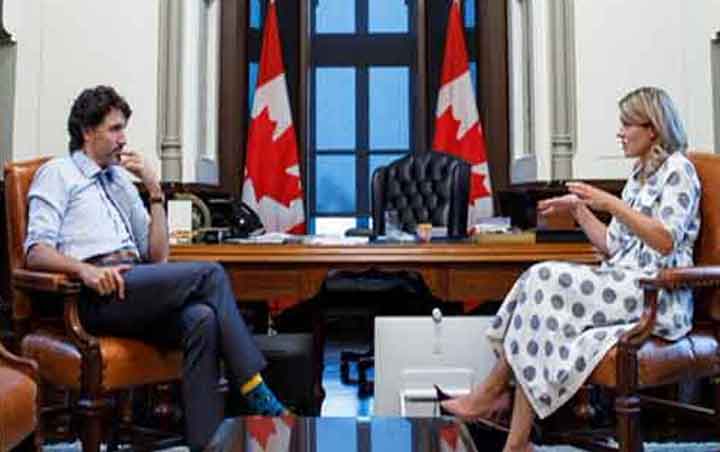INVC NEWS
New Delhi : Discover why India’s ban on non-basmati rice exports has created global panic and triggered inflationary concerns worldwide. Understand the implications and the actions taken by NRIs in response to this decision.
The Government of India made a decision that sent shockwaves across the globe. The decision was to ban the export of non-basmati white rice. Since this announcement, major organizations worldwide have been gripped with fear over the potential impact on global inflation.
Even the International Monetary Fund (IMF) chimed in, discussing the possibility of lifting the ban from India. The IMF expressed concern that the ban could lead to a surge in global inflation, further heightening tensions around the issue.
Over the past few days, videos of Non-Resident Indians (NRIs) lining up at stores in the United States and Canada to stock up on rice have gone viral on social media. Reports suggest that NRIs are rushing to buy bags of rice both from foreign countries and from India. So why has India’s decision caused such a commotion in the world, and what is happening in foreign countries regarding rice?
Why Has India Banned Non-Basmati Rice Exports?
First and foremost, it is essential to understand the reason behind India’s ban on the export of non-basmati white rice. The decision was driven by domestic compulsions, particularly concerning the agricultural sector.
Late monsoon and heavy rains have severely damaged crops, leading to a scarcity of rice across India. As a result, rice prices have skyrocketed domestically, causing concerns about inflationary pressures. In response to this situation, the Government of India implemented the export ban to maintain control over inflation and secure adequate rice supplies for its citizens.
India’s Decision Causes Global Panic
Now you might wonder, why is there such a significant reaction worldwide to India’s domestic policy measure? The answer lies in India’s prominent role in the global rice market.
India happens to be the largest exporter of rice globally, and its share in rice exports amounts to a staggering 40 percent. Therefore, when such a major player in the rice trade suddenly bans its exports, it sends shockwaves throughout the international community.

Panic Among NRIs in Canada and the US
The ban on non-basmati rice exports has had a particularly strong impact on NRIs, especially the Telugu community, residing in Canada and the United States. Reports indicate that NRIs are rushing to purchase and hoard rice in response to the uncertainty created by India’s decision.
Numerous videos on social media platforms show NRIs in cities like Dallas, Texas, filling their shopping carts with bags of rice from supermarkets and stores, attempting to secure their supply.
NRIs Are Also Stocking Up on Basmati Rice
The fear of potential scarcity and rising prices has driven NRIs not only to stock up on non-basmati rice but also on basmati rice, which fortunately remains unaffected by the export ban. This demonstrates the extent of concern among the diaspora about the impact of India’s decision on rice availability and prices.
Fear of Rising Inflation Globally
India’s ban on rice exports has triggered fears of more than just a shortage of favorite rice varieties for overseas Indians. Economists and experts worry that this move could lead to rising inflation on a global scale.
In a press conference on July 25, Pierre-Olivier Gourinchas, the chief economist of the International Monetary Fund, expressed these concerns. The potential surge in global inflation could have far-reaching consequences on economies worldwide.
India’s Justification for the Ban
India has promptly responded to the concerns raised about its ban on non-basmati rice exports. The Indian government asserts that this decision was taken to ensure a sufficient supply of non-basmati white rice in the domestic market and to stabilize rice prices within the country.
The statement released by the government also points out that retail prices of rice have increased by 11.5 percent in just twelve months, indicating the severity of the situation and the need for decisive action.
Some Facts About India’s Rice Exports
It is important to recognize the significance of India’s rice exports in the global context. In the previous year, India exported a staggering 55.4 million metric tonnes of rice, making it a key player in the international rice trade.
Of this total, 17.86 million tonnes comprised non-basmati rice, out of which 10.3 million tonnes consisted of non-basmati white rice. These figures highlight the scale of India’s contribution to the global rice market and underscore why its policy decisions can have profound implications worldwide.
Conclusion
In conclusion, India’s ban on the export of non-basmati white rice has created a stir not only within its borders but across the globe. As the largest exporter of rice, India’s decision to restrict its rice trade has led to concerns about inflation and rice availability in various countries.
The impact of this ban has been particularly palpable among NRIs, who are stockpiling rice in response to the uncertainty surrounding the situation. Experts fear that rising inflation could pose significant challenges for economies worldwide.
India’s move to justify the ban by highlighting domestic factors demonstrates the severity of the situation and the government’s commitment to managing the crisis effectively.
As the situation continues to unfold, global markets will closely monitor developments in India’s rice sector. The repercussions of this decision could have lasting effects on the global rice trade and the economic landscape at large.













